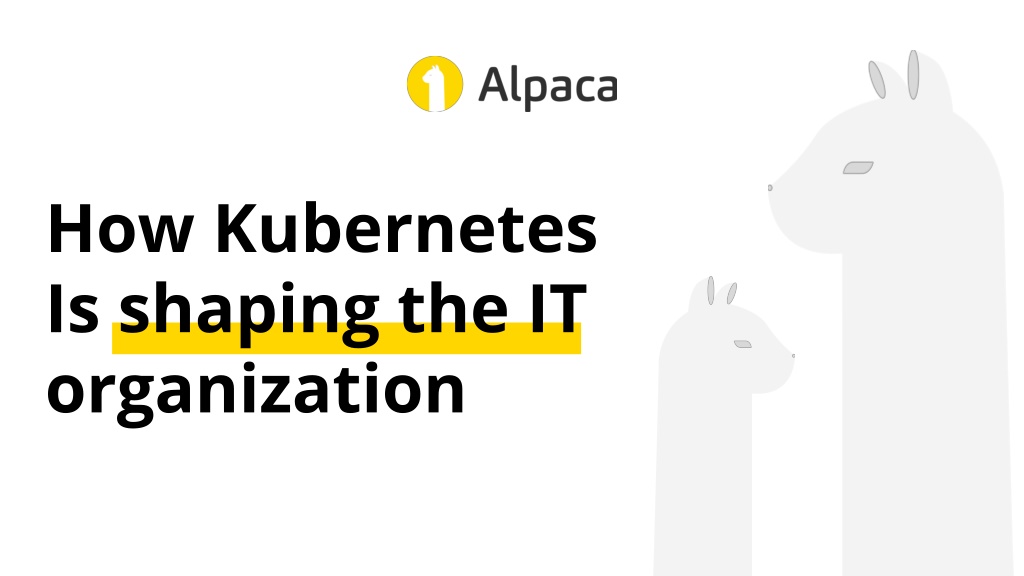Understanding the Impact of Kubernetes on IT Organizations
Kubernetes is reshaping IT organizations by enabling scalable deployments, infrastructure automation, and closer collaboration between development and operations teams. Adoption involves careful consideration of benefits and consequences, starting with stateless workloads and gradually incorporating advanced tools for release management, monitoring, and security. The shift towards cloud-native architectures requires a holistic approach to adapt processes and facilitate continuous integration/continuous deployment (CI/CD) practices.
Uploaded on Dec 15, 2024 | 0 Views
Download Presentation

Please find below an Image/Link to download the presentation.
The content on the website is provided AS IS for your information and personal use only. It may not be sold, licensed, or shared on other websites without obtaining consent from the author. Download presentation by click this link. If you encounter any issues during the download, it is possible that the publisher has removed the file from their server.
E N D
Presentation Transcript
How Kubernetes Is shaping the IT organization
Introduction Former Head of Engineering / Digital IT Chapter Area Lead @ Magyar Telekom Engineering Lead @ Alpaca BUD Microservices on K8s - 1000+ pods per cluster Close to 10 agile teams Mostly JVM based workloads On premises deployment US stocks trading API for everyone Exclusively running on K8s/GCP Mostly Go based workloads Low latency data processing (financial markets data) Scaled for high performance
Is Kubernetes for me? As a backend engineer Probably yes! As an IT company Backend focus? Scale? Complexity / diversity of the IT landscape Serverless / Firebase? ...
Is Kubernetes for me? As a backend engineer Probably yes! There is hype, but apart from that, it worth a careful consideration. It is not the solution for everyone AND it will come with certain consequences. As an IT company Backend focus? Scale? Complexity / diversity of the IT landscape Serverless / Firebase? ...
How to introduce K8s in your IT It may not be too complex to start Managed (GKE, AKS, EKS), Productized (Openshift, ...), Unmanaged Stateless workloads first Start with something non mission critical, migrate more apps later Most things can be dockerized, but greenfield app development with twelve factor app (https://12factor.net/) principles will make things easier
Later, you should think about... It may not be too complex to start Helm for release management CI/CD of your choice (or anything K8s native) Monitoring (Prometheus, Grafana) Log aggregation and indexing (Loki, ELK, ...) Stateful workloads (databases) Stateful infrastructure elements (message queues, caching - Redis) Cloud native architecture and technologies Security Secret management Network architecture
Ok - so if we do all of these, what is about to change? Blurring line between application development and infrastructure operations It is not just technology upgrade! Strict separation of development and infra/ops will not work as before Processes should adopt to CI/CD, frequent releasing, etc. Cost calculation, estimation and accounting (within the organization) Engineering roles! Developers should know more about the runtime/infrastructure Ops should be more about DevOps, infrastructure, investigators (like ad-hoc PromQL) Infrastructure engineers: more connectivity to others Software architects: shifting to microservices, event driven architectures built with cloud native components
Case study #1 - Who should be involved 1 App is not working properly Ops? 2 Backing service is not available (TCP connection refused) Network/infra? 3 K8s service is accessible but no pods behind it Infra? 4 Backing pods try to run but liveness check fails Devs? 5 No code change, but DB connections slow Infra/DBA? 6 DB connection pool saturated while at 100% CPU use DBA? 7 Missing index on a table Devs
Thanks for Listening! For more about Alpaca s API based stock trading platform, visit: https://alpaca.markets For questions, discussions, contact: https://linkedin.com/in/martonwaszlavik For more about Kubernetes @ Telekom, watch out for: Peter Szelestey s presentation Alpaca is hiring in Budapest! - https://alpaca.markets/jobs Backend software engineer Devops engineer IT Operations specialist and more

